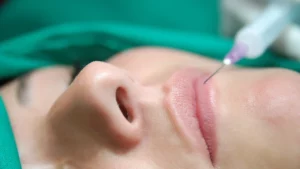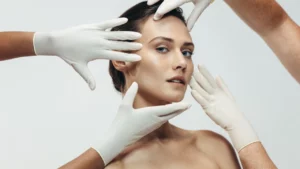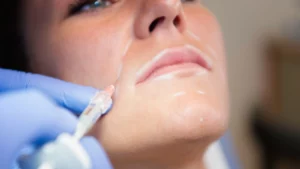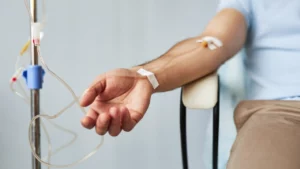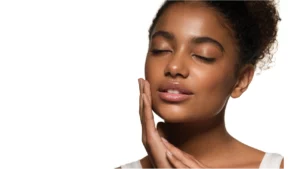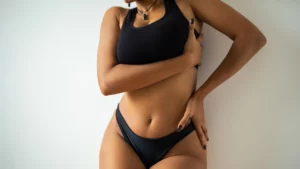Table of Contents
India is seeing the worst possible version of the second wave of Covid-19. It’s likely that you know at least a handful of people who’ve been infected and suffered from it.
And while the disease affects you internally, it also shows up in the forms of skin and hair issues such as inflammation, dryness and hair fall.
Here, we’re decoding each of the most common post Covid-19 skin and hair issues that you’re most likely dealing with and how you can manage and treat them.
Hair fall

Covid-related hair fall will affect at least 30% of people who have battled with the disease. It can be caused by stress from the infection altogether or medication like Ivermectin, Azithromycin and Lopinavir.
The hair fall you experience can be of three types:
- Anagen effluvium, wherein the hair that’s actively growing starts to fall out
- Telogen effluvium where the resting hair starts to fall out and
- Worsening of male pattern balding
The best way to treat hair fall post Covid is to take extra care of your hair and health.
We prescribe taking an iron supplement 325 mg twice a day along with vitamin C tablets which help absorb the iron better. Try not to take your iron supplement with any other minerals.
Hair vitamins like Trichospire or Hair Fact are cyclical dose vitamins that provide your body with different things at different times of the day and are designed to work with the circadian rhythm of the body.
Protein supplementation is also essential but please note that whey protein, casein or whey isolate will worsen the situation since they increase inflammation. Post Covid-19, you already have excess inflammation which is why collagen supplements work much better.
Rashes
When skin concerns are in question, Covid-19 can cause a host of things. You can start to notice rashes in the flexural areas, hips, buttocks.
It can be a red, bumpy little rash, flakiness, peeling of skin. These rashes are vague and actually happen to quite a few patients. The best way to treat these is supported care which involves gentle cleansing, a lot of moisturisation, using cocoa butter or Vaseline jelly and it will take from a few weeks to a few months for you to see results.
Chilblains
Chilblains are essentially the phenomenon of your fingers and toes turning blue.
To tackle this, we suggest you see a dermatologist or skin specialist so medication can be prescribed (drop us a text, if you’d like!). In the meantime, keep the area warm with warm socks.
Acne and rosacea
If you’re someone who deals with chronic acne or rosacea, the inflammation in your body caused by Coronavirus can aggravate both of these concerns.
As we previously mentioned, the medication taken while battling the infection can also trigger either of the two skin problems.
For acne, the best way forward is to make sure you’re using non-comedogenic skincare, gel-based cleansers and moisturisers and incorporating ingredients like azelaic acid into your routine.
This can help with acne and soothe the skin at the same time. If this doesn’t seem to help, speak to your dermatologist to get a prescription of adapalene, isotretinoin or benzoyl peroxide to spot treat your bumps.
Dry skin

Skin issues pertaining to dry skin such as psoriasis or eczema can also worsen due to Covid-19. If you do notice that your skin is acting up in the form of dry patches, it’s time you pay attention to the cleanser and moisturiser you’re using to heal your body.
We recommend using the FCL Oatsilk Soap Free Body Wash, FCL Oatsilk Body Lotion or Bioderma Atoderm Intensive Baume Ultra-Soothing Balm for intensive hydration and repair.
You may notice that your skin is peeling off for a few weeks or even months after you are done with your treatment for Covid-19.
Continue moisturising your skin and you will notice a difference soon. The best kind of moisturisers are those with humectants such as sodium lactate, urea, lactic acid, ceramides, coconut oil, cocoa butter or even Vaseline jelly.
Pigmentation and tanning

A lot of people who are healing from the effects of Covid-19 complain of skin tanning or pigmentation. This occurs when your skin is damaged because your body starts to release melanin which becomes the first visible sign of damage.
The internal inflammation that’s being caused due to the virus can lead to pigmentation showing up on your face and body.
You can use Alpha Hydroxy Acid- (AHA) based cleansers or lotions to help treat the pigmented patches on your skin (face and body).
Vitamin C-based skincare is also a great option to help tackle pigmentation. Make sure you continue to wear sunscreen to prevent any more skin damage. You can also take antioxidant supplements like Glutathione or N-Acetyl Cysteine to help boost antioxidant levels to prevent further damage and heal your skin.


